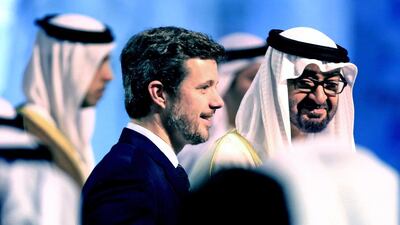ABU DHABI// The energy needs of developing countries were the focus on the first day of Abu Dhabi Sustainability Week on Monday.
The event started with a panel discussion on Africa, attended by the presidents of Senegal and Sierra Leone and the prime minister of Ethiopia.
The audience at the Abu Dhabi National Exhibitions Centre included Sheikh Mohammed bin Zayed, Crown Prince of Abu Dhabi and Deputy Supreme Commander of the Armed Forces, and other prominent UAE and foreign dignitaries.
Developing countries can benefit the most from new clean-energy technologies, said Dr Sultan Al Jaber, Minister of State and chief executive of Masdar.
For the countries who choose this route, “access to modern technologies can allow them to leapfrog inefficient technologies of yesterday and directly adopt the advanced technologies of today”, he said.
For Africa, “a region constrained primarily by an energy sector with high costs, poor reliability and limited access”, renewable power is not an option but a must, he said.
“Only through the adoption of today’s clean technologies can Africa harness the power of its natural resources,” Dr Al Jaber said.
Steady economic growth and a rising middle class means that by 2030, energy demand is expected to nearly triple in Africa, said Dr Adnan Amin, the secretary general of the International Renewable Energy Agency.
The African officials were keen to stress their countries’ interests in attracting foreign investors in the energy sector.
“We have opted for a climate-resilient green growth strategy to achieve medium income in my country in 2025,” said Hailemariam Desalegn, the prime minister of Ethiopia.
A main focus of the strategy will be to harness the country’s vast green-power resources. Ethiopia is developing 8,500 megawatts of hydro, wind and geothermal power and has the potential for a million megawatts of wind energy, said Mr Desalegn. The country is also taking steps to export energy to neighbouring states.
“Africa has this opportunity to contribute to the global sustainable energy development and therefore we now encourage and also invite private sector to support this capital intensive development in the energy sector,” he said.
Ernest Bai Koroma, president of Sierra Leone, spoke of the changing political landscape in some parts of the continent, where “we now have countries that have democratic leaders, we now have governments that are committed to transparency and to good governance”.
Besides increased political stability, some African countries have recorded strong economic growth and are expected to continue to do so, he said.
“Africa has positioned herself and it is going to be the engine for economic growth that will not only serve Africa but be a destination for world economic growth,” Mr Koroma said. “That is why we believe conferences like these, engagements like these, are welcome developments for Africa to be marketed.”
As well as providing a platform for African leaders to showcase their countries, Abu Dhabi is also engaging with Pacific Island nations, which experts believe will be among the hardest-hit from the impacts of the global sea-level rise.
On Monday, the UAE signed partnership agreements with five countries in the region to deploy solar and wind projects financed from the US $50 million (Dh183.7m) UAE-Pacific Partnership Fund.
The projects – in Fiji, Kiribati, Samoa, Tuvalu and Vanuatu – will be implemented by Masdar and are due to be finished by the end of this year. Grant financing is to be provided by the Abu Dhabi Fund for Development.
The projects are estimated to save more than 1.2 million litres of diesel fuel annually and mitigate 3,030 tonnes of CO2 per year.
The UAE-Pacific Partnership Fund was launched in March last year by Sheikh Abdullah bin Zayed, Minister of Foreign Affairs, and is administered by the ministry’s Directorate of Energy and Climate Change.
A solar plant in Tonga, commissioned in November last year, was the first project to receive funding from the UAE under the scheme.
vtodorova@thenational.ae

